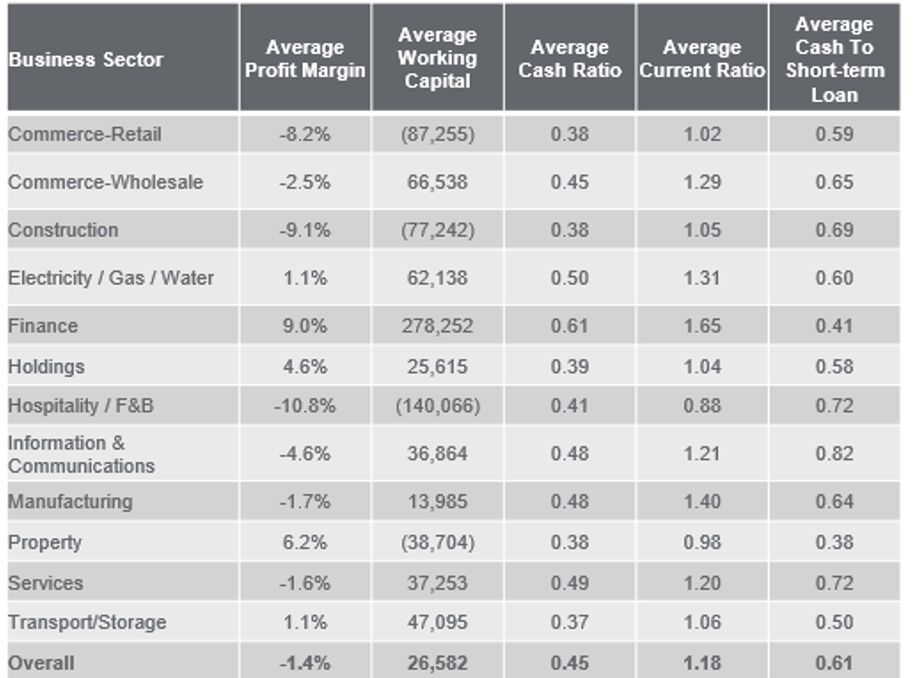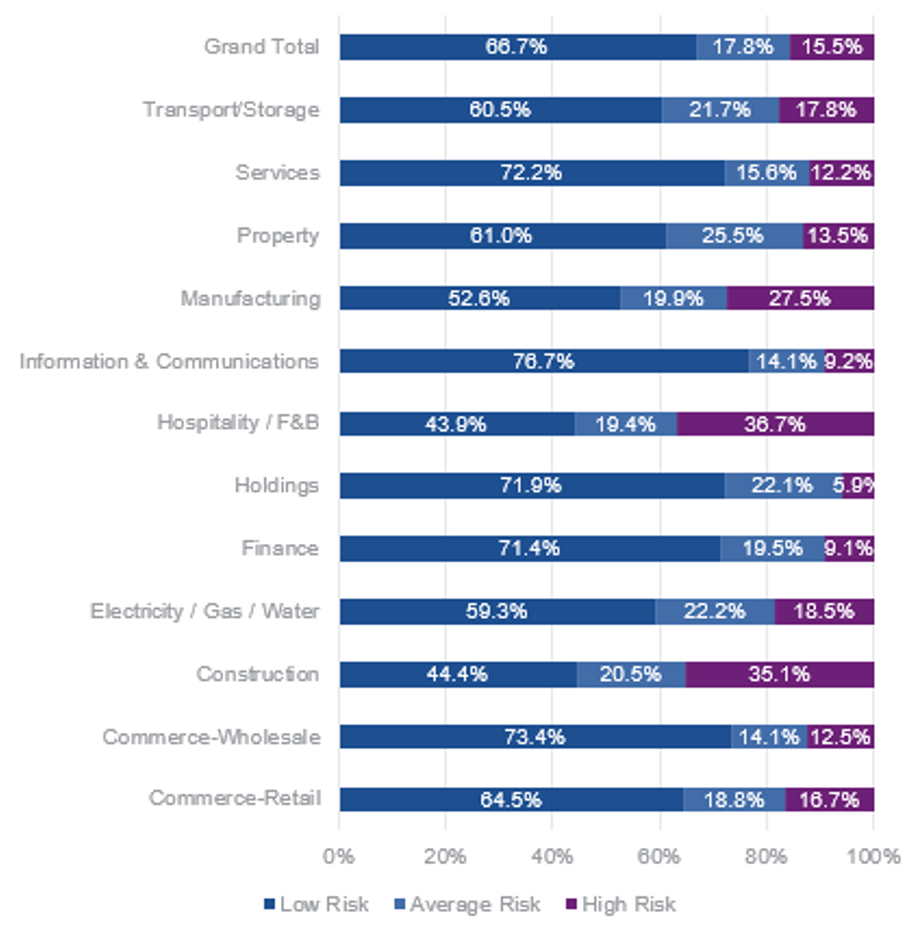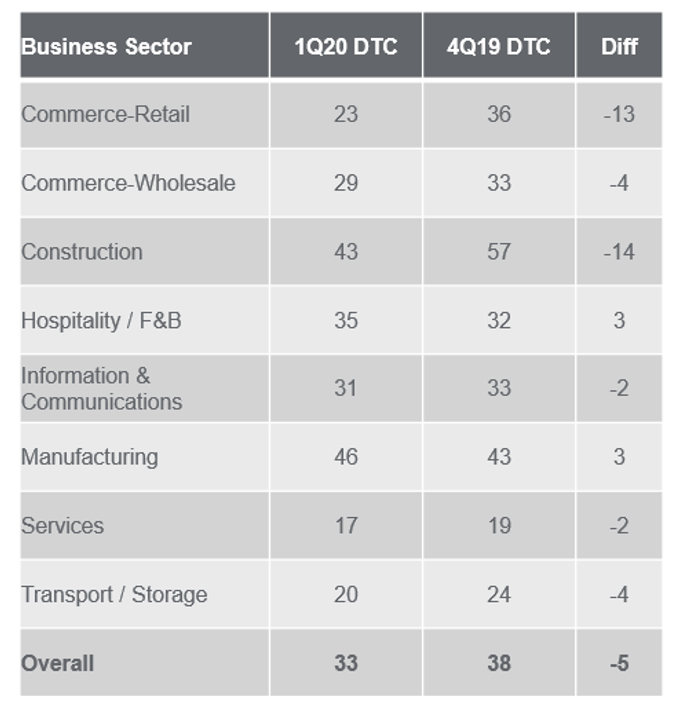- Based on analysis of financials and credit ratings of more than 50,000 SMEs, 61 per cent demonstrated lower credit ratings, making them more exposed to short-term vulnerabilities in adverse economic conditions, going into COVID-19.
- Hospitality / F&B, Retail, Construction, and Services sectors encapsulated the majority of companies with high risk default standings.
- Average negative margins observed across most sectors, especially among micro and mid-size SMEs. While overall average Working Capital remained positive, four out of 12 sectors could be facing immediate cash flow challenges.
- While shorter debt payments timelines were observed among SMEs, sectors identified to be most at risk for delinquent payments are Hospitality/F&B, Electricity/Gas/Water, Manufacturing, and Construction.
SINGAPORE, 08 May 2020 – Many Singapore SMEs possess vulnerabilities in the areas of credit standing, cash flow, liquidity, and liabilities that could impact their immediate ability to effectively weather economic challenges arising from the COVID-19 pandemic. This was the key finding from Experian’s study of financials and credit ratings of more than 50,000 Singapore SMEs across 12 sectors and analysed through the Experian Ascend: Analytics on Demand platform. Additionally, the study was complemented by Experian’s debt payment analysis generated through its Non-Bank Credit Bureau.
The findings covered 12 key sectors and provided a snapshot of the financial and risk profiles of Singapore SMEs as they head into an uncertain business environment. The study broadly looked at the SMEs’ financial positions and their debt payment behaviour, identifying sectors that were most vulnerable and potentially needed more targeted support.
Sustained Impact of Global Headwinds on Credit Ratings
Based on the analysis from the latest financial statements of over 50,000 SMEs, Experian found that 61 per cent of the SMEs analysed would have entered the current crisis with lower credit ratings of DP7-DP8. Such ‘high risk’ SMEs would have had existing access to capital challenges with lenders, given lacklustre trading conditions in 2019 and the companies’ weaker credit profiles.
Table 1: DP Credit Ratings of Singapore SMEs Across 12 sectors

The ratings are based on Experian’s proprietary credit rating model designed for the Singapore market that assesses the probability of default (PD) of an organisation based on its financials. Organisations are rated on a scale of DP1 – DP8, where DP1 denotes the lowest probability of default and DP8 indicates the highest probability of default.
A majority of Singapore SMEs were already experiencing ‘high risk’ credit ratings positions entering 2020, likely caused by business challenges exacerbated by the US-China trade war, a depressed manufacturing output and weak discretionary consumer spending in 2019. Among the sectors with weaker DP Credit Ratings are Hospitality/F&B (81%), Information & Communications (72%), Commerce-Retail (70%), Construction (70%) and Services (70%).
SMEs’ Financial Positions Intensified by Profit Margin Pressures
In addition to credit ratings, Experian also analysed the SMEs’ near time financial strength, with short term cash flow and debt exposure a concern for most SMEs. While overall working capital remained positive, organisations in Commerce-Retail, Construction, Hospitality/F&B, and Property appear to be experiencing challenges related to cash flow.
Seven out of 12 sectors surveyed registered negative Profit Margins, resulting in an overall negative reading. Such negative profit margins were of concern especially for sectors comprising of younger SMEs where their ability to generate returns over time were comparatively weaker.
Table 2: Singapore SME Financial Strength and Exposure

The impact has been the most pronounced for SMEs in the Commerce-Retail, Construction, Manufacturing, and Hospitality/F&B sectors. While micro SMEs (organisations with a turnover of less than S$1M) usually hold weaker financial positions due to thinner profit margins, their larger counterparts (organisations with a turnover of S$1M to S$10M) were observed to also be struggling with negative margins.
Table 3: Singapore SMEs Financial Strength & Exposure

Closer payment behaviour monitoring will also be critical for SMEs in Hospitality/F&B, Retail, and Construction. Organisations within these sectors were observed to hold higher liquidity risk, as well as weaker profit margins, working capital and cash ratio positions, elevating their risk profiles.
The study also assessed the likelihood of higher risk SMEs (DP7-DP8) to pay off their debts through the SME Network Score analysis. 15.5 per cent of such SMEs were deemed to be at high risk of further delaying payments. Findings also indicated a higher than average concentration of companies with a higher propensity to further delay payments fell within Hospitality/F&B (36.7%), Construction (35.1%) and Manufacturing (27.5%), suggesting possible weakness within these sectors.
Table 4: High Risk SMEs (DP7-DP8) by SME Network Score (April 2020)

These results were based on Experian’s SME Network Score, a credit risk model which predicts the likelihood of delayed payments beyond 60 days past due, or a measure of willingness to pay. The score combines traditional data and analytics with non-traditional data and machine learning methodologies for increased predictive power and coverage.
In the lead up to COVID-19 Impact, more SMEs are Paying Debts on Time
In a parallel study, trade payment trends in Experian’s Non-Bank Credit Bureau were also tracked. The overall Days Turned Cash (DTC) – a measure of how quickly SMEs pay their debts – registered a decrease to 33 days in 1Q2020, down five days from 4Q2019. This may reflect a tightening in supplier credit, especially on sectors such as Construction (improvement by 14 days) and Commerce-Retail (improvement by 13 days), where sector confidence is weak, and creditors are following up on payments with greater urgency.
Table 5: Singapore SME Trade Payment (1Q2020 vs 4Q2019)

Additionally, 13 per cent of SME debts in 1Q2020 were paid more than 90 days beyond terms, a decrease from 19 per cent in the previous quarter.
The decrease in DTC within the Construction sector is fuelled by a significant decrease in debts settlement beyond 90 days, down to 16 per cent from 33 per cent in the preceding quarter. According to MTI figures, the Construction sector shrank by 4.3 per cent on a year-on-year basis in 1Q2020, a reversal from a 4.3 per cent growth rate registered the previous quarter. Performance was primarily impacted by a decline in private sector construction activities, while supply chain and manpower disruptions due to COVID-19 lockdowns have also adversely affected construction projects. Current anticipated delays in project delivery or completion will adversely impact cash flow projections and erode overall confidence in the sector.
The Retail sector also registered a recovery in DTC in 1Q2020 to 23 days (from 36 days in the prior quarter), the lowest reading since 1Q2017 (20 days). The latest figures from the Department of Statistics (SingStat) indicated that Singapore retail sales fell at the steepest pace in more than 12 years on a month-on-month basis. Travel restrictions have led to a sharp fall in tourist arrivals while locals are reducing discretionary spending out of caution, adversely impacting retail sales. Retail creditors may be following up on invoices with greater urgency given the decline in sectorial outlook.
Implications for the Singapore Economy
Underscoring the severity of the economic fallout stemming from the pandemic, figures from the Ministry of Trade and Industry (MTI) indicated that Singapore’s GDP had contracted by 2.2 per cent in 1Q20. With no clear end to the global pandemic on the horizon, MTI had also downgraded the city state’s growth forecast for 2020 to -4 to -1 per cent.
The Hospitality/F&B, Retail, and Construction sectors were noticeable as high risk across nearly all measurements, suggesting that they may continue to face significant challenges in the immediate term. SMEs in F&B and Retail registered one of the lowest levels of business optimism in the SBF-Experian SME Index released in April 2020, having weathered the brunt of travel and movement restrictions implemented in the wake of the COVID-19 outbreak which has impacted sales.
Construction projects are likely to experience delays due to the mandatory Stay Home Notices issued to all foreign workers in the sector. Any delays in project delivery and completion can impact cash flow projection among Construction SMEs, eroding confidence in the sector.
“While the broad-based support extended by the Government so far has been helpful, we should also explore a clinical and data-driven approach in view of the abundance of rich information available. A strategic approach to minimise the negative impact to the Singapore economy is to leverage analytics capabilities for actionable insights. This will facilitate the accurate identification of specific sub-segments and companies that may require closer intervention along the evolving stages of the current economy, accelerating its recovery,” urged James Gothard, General Manager, Credit Services & Strategy, Southeast Asia, Experian.
